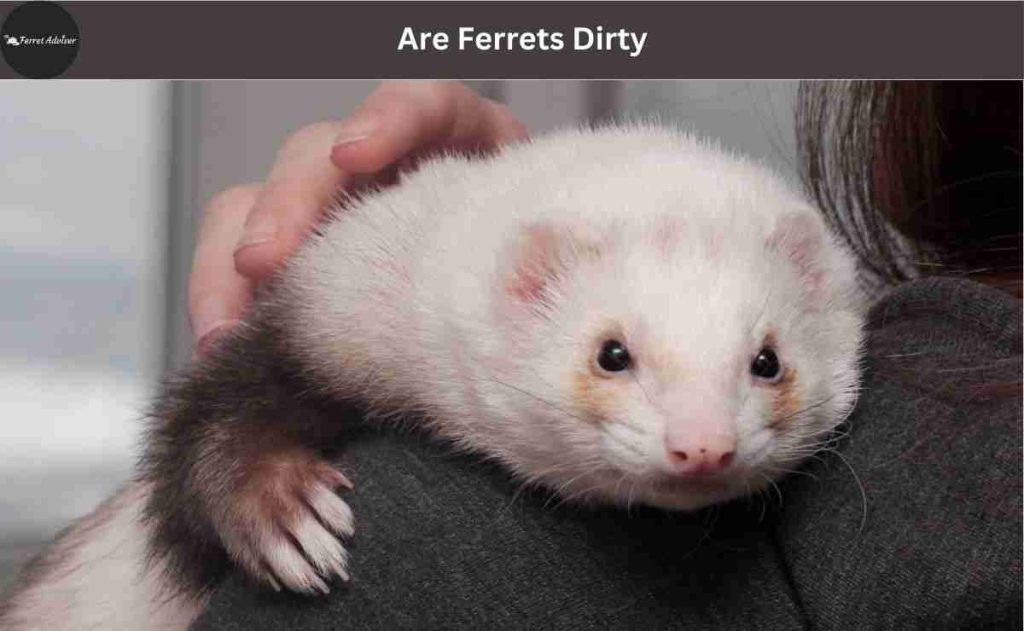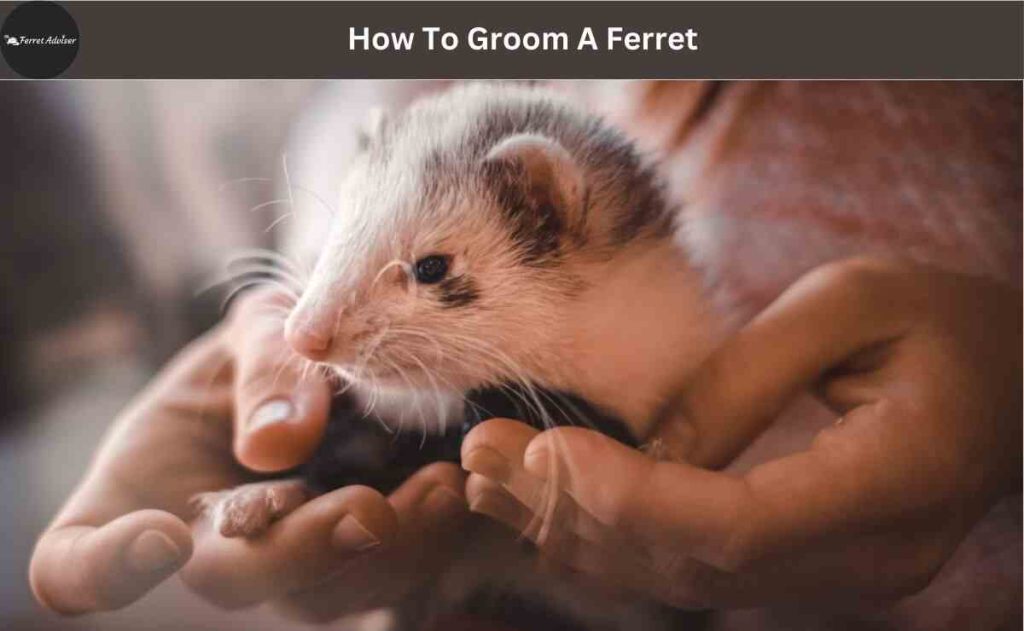There is a misconception that ferrets are dirty. Though ferrets have a musky smell, many think these pets are dirty. However, in reality, ferrets are very clean animals.
The smell comes from their oil glands all over the body. The smell is not that much strong. Eventually, ferret owners get used to it and don’t even notice it.
By the way, ferrets used to clean themselves. They don’t even require a water bath or dust bath. They groom themselves using tough and paw and remove dirt and debris.
Are Ferrets Dirty?

Ferrets are naturally curious and energetic animals. They are great as pets. If you are thinking of adopting them as pets, it will be a good choice.
Typically, ferrets have a mild musky or earthy smell because of their oil glands and you can’t remove it. Further, ferrets have anal glands that also spread stinky fluid.
Like other animals, ferrets also have anal glands too. It releases a foul-smelling fluid to mark territory. In most pet stores, they remove their anal glands at a very young age through descending process. So there is less chance of smelling bad for this reason.
Furthermore, ferrets have high metabolic rates, leading to frequent bowel movements. They poop a lot like 10 times a day. You can’t stop it. So it would be better if you trained them to use the litter box to maintain proper hygiene.
If you do not clean the litter box regularly, the feces will spread a bad smell. Proper hygiene practices in their living area can help maintain cleanliness.
Ferrets are clean pets themselves. If you keep clean and take care of the closure, bedding, regularly clean potty, and surrounding space, dirtiness won’t be an issue.
The bad odor and dirtiness are most noticeable when ferrets are not regularly groomed or when their living environment is not adequately maintained. However, with proper care, you can significantly reduce the intensity of their natural scent.
How to Prevent Ferrets From Stinking?
Ferrets can make great pets, but one downside is that they can sometimes have a strong odor. Luckily, there are steps you can take to prevent your ferret from stinking up your home.
First and foremost, proper hygiene is key. Regularly cleaning your ferret’s cage is important in minimizing odors. This includes scooping out waste daily and doing a full cage cleaning at least once a week. You need to wash your ferret’s bedding regularly to keep it fresh and odor-free.
Grooming your ferret is another important aspect of preventing foul smells. Grooming includes brushing teeth, clipping nails, cleaning ears, and bath once or twice a month.
You can brush their coat regularly which also helps prevent odor. Brushing will help remove loose hair and keep your ferret’s coat clean and free of oils.
Lastly, maintaining proper ventilation in your home is important. Provide adequate airflow in the room where your ferret’s cage is located, as this can help minimize odors from building up.
How To Groom A Ferret?

Regular grooming not only helps keep your ferret looking clean and healthy, but it also helps prevent the buildup of oils and dirt that can lead to skin problems.
Grooming should be a positive experience for your ferret. Take your time and be gentle, offering treats or rewards to make it a pleasant experience.
In this section, we will provide you with a step-by-step guide on how to groom a ferret.
1. Brushing
Ferrets groom themselves using their tongue. The saliva releases from their tough cause hairballs. Regular brushing helps to remove loose hair and prevent clotting.
You can use a soft bristle brush or a ferret-specific brush to gently brush your ferret’s fur. Start from their head and work your way down to their tail, being careful around sensitive areas like the ears and paws.
2. Bathing
Ferrets have a natural musky odor, you can’t remove it. But regular bathing can help to keep them smelling fresh. Bathing is not too necessary still you can bathe them if ferrets become dirty like rolling out on something, or making a mess while eating.
Fill a sink or tub with lukewarm water and use a ferret-safe shampoo. Gently lather the shampoo into their fur, avoiding the face, ears, and eyes. Rinse thoroughly to remove all traces of shampoo.
3. Nail Trimming
Ferret’s nails can become overgrown if not regularly trimmed. Use a small animal nail clipper to carefully trim their nails, taking care not to cut too close to the quick. If you are unsure, consult a professional groomer for guidance.
4. Dental Care
Ferrets have the same pair of teeth as you can see in dogs and cats. Just like other pets, there is plaque and calculus build-up on ferrets’ teeth. So ferrets teeth need dental care too. Otherwise, your ferrets will have dental disease, gingivitis, and loss of teeth.
Regular brushing is a good step to prevent dental problems. It would be better if you brush at least once a week. Use a soft toothbrush with short bristles and brush their teeth. Don’t use a human toothbrush.
5. Ear Cleaning
Ferrets are prone to earwax build-up in their ear canals. Regular cleaning is necessary or it will stink. Use a cotton ball dampened with a ferret-specific ear cleaner to gently clean the outer part of their ears.
Avoid using cotton swabs or inserting anything into their ear canals.
6. Eye Cleaning
Ferrets can get tear stains around their eyes. Use a damp cloth or cotton ball to gently wipe away any discharge or stains.
If there is excessive tearing or redness, consult your veterinarian.
Do Ferrets Need Baths?
Ferrets are low-maintenance pets. They need baths, but not as often as other pets. Unlike cats and dogs who clean themselves regularly, ferrets do not have self-cleaning instincts.
Ferrets have naturally oily skin, which can cause them to develop a strong odor over time if not properly cared for. They don’t need bathing as they clean themselves.
Bathing just helps to keep your ferret smelling fresh. It doesn’t remove the natural musky odor. Remember, over-bathing can be harmful to your ferret’s skin and coat. Bathing them too frequently can strip their skin of its natural oils, leading to dryness and irritation.
Therefore, it is recommended to bathe your ferret once every few months, or as needed if they get particularly dirty or smelly.
When bathing your ferret, it is important to use a ferret-specific shampoo that is gentle and non-drying. Regular human shampoos or pet shampoos can be too harsh for their sensitive skin.
Use lukewarm water and be gentle when handling your ferret during the bath to prevent any stress or accidents.
After bathing, thoroughly dry your ferret with a towel or a low-heat hairdryer. Make sure they are completely dry before allowing them to return to their living area, as a damp ferret can easily catch a chill.
In addition to regular baths, maintain good hygiene for your ferret by regularly cleaning their cage and bedding. This will help to prevent any build-up of odors and ensure a clean and healthy environment for your pet.
Conclusion
Although ferrets may have certain habits that some individuals may find unclean, they are not inherently dirty animals. However, with appropriate care, hygiene practices, and a clean living environment, ferrets can be kept as clean and well-maintained pets.
Regular cleaning of the cage, bedding, and litter box is essential to keep ferrets healthy. Regular grooming is also important to remove any excess oils and dirt and maintain a healthy coat.
